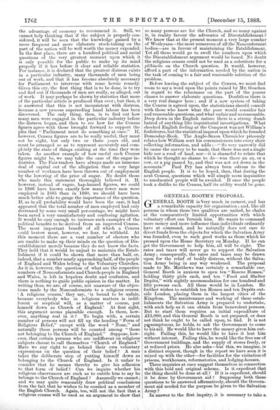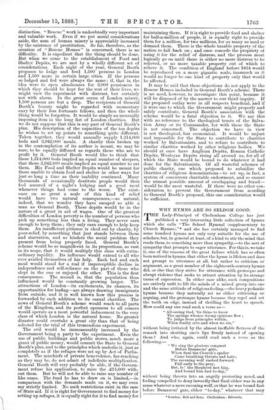GENERAL BOOTH'S PROPOSAL. G ENERAL BOOTH is every much in earnest,
and has a remarkable capacity for organisation ; and, like all persons in whom these two qualities are united, he chafes at the comparatively limited opportunities with which voluntary effort can furnish him. He wants to command more money and more influence than individuals ordinarily have at command, and he naturally does not care to divert funds from the objects for which the Salvation Army was founded, even to such good works as those which he pressed upon the Home Secretary on Monday. If he can get the Government to help him, all will be right. The rates and taxes will never go to support the Salvation Army ; consequently, the rates and taxes may be drawn upon for the relief of bodily distress, without the Salva- tion Army being in any way weakened. The proposal made to Mr. Matthews was certainly a remarkable one. General Booth is anxious to open ten " Rescue Homesi" holding thirty girls each, and ten " Food and Shelter Depots," with nightly accommodation for one hundred and fifty persons each. All these would be in London. He further wishes to establish ten Homes and ten Depots out- side London, placing them in the largest cities of the Kingdom. The maintenance and working of these estab- lishments the Salvation Army is prepared to undertake, with such help as it can obtain from benevolent persons: But to start them requires an initial expenditure of £15,000, and this General Booth is not prepared, or does not think he ought to be called upon, to find. It is not pixsumptuous, he holds, to ask the Government to come tois aid. He would like to have the money given him out- right. Failing this, he would like to have it lent him without interest. Failing this, he would like the free use of Government buildings, and the supply of stores freely, or at reduced prices. He also asks—but this, we imagine, is a distinct request, though in the report we have seen it is mixed up with the other—for facilities for the visitation of prisons, workhouses, reformatories, and lodging-houses. Three inquiries at once suggest themselves in connection with.this bold and original scheme. Is it expedient that the thing should be done at all ? If it is expedient, should it be done by Government aid ? Supposing both these questions to be answered affirmatively, should the Govern- ment aid needed for the purpose be given to the Salvation Army ? In answer to the first inquiry, it is necessary to take a distinction. " Rescue " work is undoubtedly very important and valuable work. Even if we put moral considerations aside, the sum of human misery is appreciably increased by the existence of prostitution. So far, therefore, as the creation of " Rescue Homes " is concerned, there is no difficulty. It is expedient that the thing should be done. But when we come to the establishment of Food and Shelter Depots, we are met by a wholly different set of considerations. Each night of the year, General Booth proposes to lodge and feed 1,500 persons in London and 1,500 more in certain large cities. If the persons so lodged and fed were always the same ; if, that is, the idea were to open almshouses for 3,000 pensioners in which they should be kept for the rest of their lives, we might view the experiment with distrust, but certainly not with alarm. In the great ocean of London misery, 1,500 persons are but a drop. The recipients of General Booth's bounty might be regarded with momentary envy by their less fortunate fellows, and then the whole thing would be forgotten. It would be simply an unusually imposing item in the long list of London charities. But we do not suppose that this is any part of General Booth's plan. His description of the capacities of the ten depOts he wishes to set up points to something quite different. Taken together, they would annually supply 1,314,000 beds and 3,942,000 meals. A charity thus broken up in the contemplation of its author is meant, we may be sure, to be equally diffused as regards those who are to profit by it. General Booth would like to think that these 1,314,000 beds implied an equal number of sleepers, that these 3,942,000 meals implied an equal number to eat them. His Food and Shelter Depots would be meant for those unable to obtain food and shelter in other ways for just so long a time as their inability continued. Many thousands of occasionally destitute people would thus feel assured of a night's lodging and a good meal whenever things had come to the worst. The exist- ence on so great a scale of this kind of relief would have two natural consequences,—so natural, indeed, that we wonder they have escaped so able a man as General Booth. These depots would be in the nature of a grant in aid of wages. One of the greatest difficulties of London poverty is the number of persons who pick up something less than a living. They never earn enough to keep them ; they only earn enough to help keep them. An insufficient pittance is eked out by charity, by poor-relief, by something that just stands between them and starvation, and so hinders the social problem they present from being properly faced. General Booth's scheme would be so magnificent in its proportions, so vast in its scope, that it would multiply this class with extra- ordinary rapidity. Its influence would extend to all who ever availed themselves of his help. Each bed and each meal would stand for a real if imperceptible decline in independence and self-reliance on the part of those who slept in the one or enjoyed the other. This is the first consequence. The second is, that the population thus influenced would be constantly growing larger. The attractions of London—its excitements, its chances, its opportunities for loafing—are always drawing immigrants from outside, and it is well known how this process is forwarded by each addition to its casual charities. The news of General Booth's scheme would reach to all parts of the Kingdom, and its perfect openness to all comers would operate as a most powerful inducement to the very class of which London is the natural home. No greater disaster could overtake a great city than that of being selected for the trial of this tremendous experiment. The evil would be immeasurably increased by the Government being a party to the experiment. Even the use of public buildings and public stores, much more a grant of public money, would commit the State to General Booth's plan, and to the principles which underlie it, just as completely as if the refuges were set up by Act of Parlia- ment. The mischiefs of private benevolence, far-reaching as they may be, do not admit of indefinite multiplication. General Booth will very probably be able, if the Govern- ment refuse his application, to raise the £15,000 with- out them. But he will not be able to raise any number of like sums. The fund he has to draw on is limited,—in comparison with the demands made on it, we may even say strictly limited. No such restrictions exist in the case of State aid. If it is right for Government to find money for setting up refuges, it is equally right for it to find money for maintaining them. If it is right to provide food and shelter for half-a-million of people, it is equally right to provide them for a million, for two millions, for as many as need or demand them. There is the whole taxable property of the nation to fall back on ; and once concede the propriety of using it for the relief of distress, and the process must logically go on until there is either no more distress to be relieved, or no more taxable property out of which to relieve it. The condition of England before 1834 would be reproduced on a more gigantic scale, inasmuch as it would no longer be one kind of property only that would be affected.
It may be said that these objections do not apply to the Rescue Homes included in General Booth's scheme. There is no need, however, to investigate this point, because it will be disposed of by the answer to our third inquiry. If the proposed outlay were in all respects beneficial, and if it were one to which the Government might properly and safely contribute, General Booth's association with the scheme would be a fatal objection to it. We say this with no reference to the theological tenets of the Salva- tion Army or its Commander, for with these the State is not concerned. The objection we have in view is not theological, but economical. It would be unjust and impossible for the State to contribute to charities worked by Salvationists, and to refuse to contribute to similar charities worked by other religious bodies. We should at once have Anglican Deptits, Roman Catholic Depots, Wesleyan DepOts rising all around us, for all of which the State would be bound to do whatever it had done for the Salvationists. Of all wasteful schemes of public charity, one which proposed to subsidise the charities of religious denominations—to set up, in fact, a system of concurrent charitable endowment, and so ensure the utmost possible amount of overlapping and fraud— would be the most wasteful. If there were no other con- sideration to prevent the Government from acceding to General Booth's proposal, this one consideration would be sufficient.















































 Previous page
Previous page